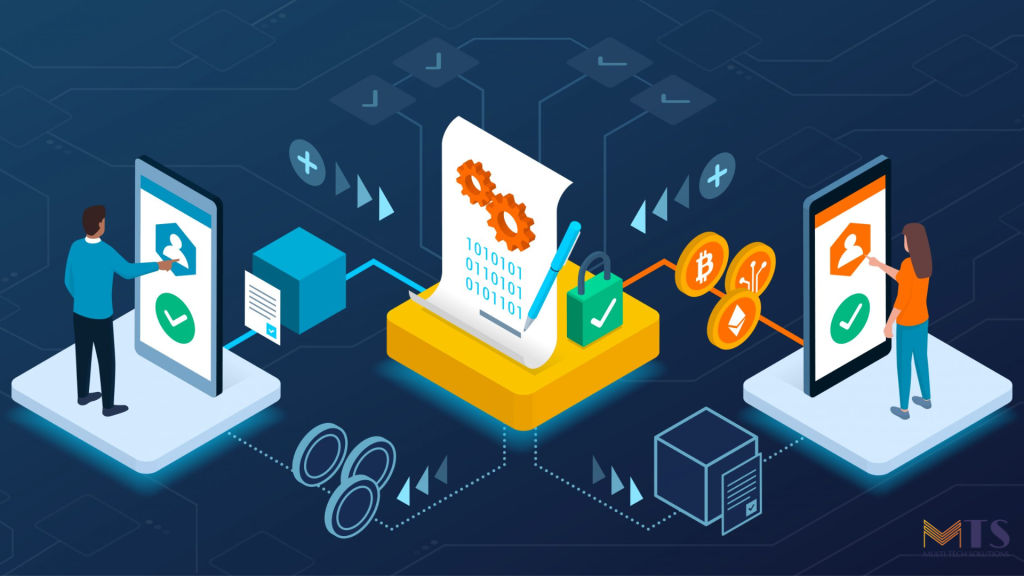
Smart contracts are a revolutionary tool in the ever-evolving tech landscape, streamlining business transactions with efficiency. These contracts, powered by blockchain technology, have gained immense significance for automating and securing operations.
Blockchain technology, initially associated with cryptocurrencies, has expanded into various industries. One of its most promising innovations is smart contracts. These contracts, operating on blockchain, offer an automated, secure, and tamper-proof means to execute agreements, eliminating the need for intermediaries. This blog explores the importance of smart contracts in simplifying business transactions and provides insights into their functionality.
The Importance of Smart Contracts
Smart contracts have become a game-changer in the business world due to their remarkable capabilities. Here’s why they are gaining immense importance:
1. Automation: Smart contracts automate the execution of agreements, reducing the need for manual intervention. This automation streamlines processes and reduces the risk of errors.
2. Security: Blockchain, the underlying technology of smart contracts, is known for its security features. Information stored on a blockchain is cryptographically protected, making it highly resistant to tampering and fraud.
3. Trust: Trust is inherent in blockchain. Smart contracts leverage this trust factor, eliminating the need for intermediaries such as banks or legal institutions, which can slow down transactions and add costs.
4. Transparency: All parties involved in a smart contract can view the terms and conditions, as well as the transaction history. This transparency enhances accountability and trust among parties.
5. Cost-Efficiency: By eliminating intermediaries and automating processes, smart contracts reduce transaction costs significantly.
How Smart Contracts Work
To understand the way smart contracts function, let’s break down the process step by step:
1. Agreement Creation:
– Parties involved define the terms and conditions of the agreement.
– These terms are translated into code, creating a smart contract.
2. Deployment on Blockchain:
– The smart contract code is deployed onto a blockchain network.
– The contract is stored in a decentralized and tamper-proof ledger.
3. Execution:
– When predefined conditions are met, the smart contract self-executes.
– The contract enforces the terms of the agreement and triggers the relevant transactions.
4. Validation:
– Transactions are validated by the network’s nodes.
– The blockchain records the transaction and updates all relevant parties’ copies of the contract.
5. Completion:
– Once the conditions are met, the contract is considered fulfilled.
– Parties receive the agreed-upon assets or perform the specified actions automatically.
Advantages and Benefits of Smart Contracts
The advantages and benefits of using smart contracts in business transactions are manifold:
1. Efficiency:
– Automation reduces the time required to complete transactions.
– Processes are streamlined, reducing human errors and delays.
2. Cost Savings:
– Elimination of intermediaries and the need for manual processes lowers transaction costs.
– Fewer resources are required for contract management.
3. Security:
– Tamper-proof blockchain technology ensures the integrity of agreements.
– Cryptographic encryption safeguards sensitive data.
4. Trust:
– Trust is built into the technology, reducing the need for trust-based relationships.
– Parties can rely on the code and blockchain for transparency.
5. Accuracy:
– Automation reduces the risk of errors associated with manual processes.
– Terms are executed precisely as defined in the code.
6. Global Reach:
– Smart contracts can be executed across borders, expanding the reach of businesses.
– Geographical limitations are virtually eliminated.
7. Reduced Disputes:
– Clear and transparent terms reduce the likelihood of disputes.
– Parties have a shared, immutable record of the agreement.
Use Cases of Smart Contracts
Smart contracts find applications across various industries and scenarios:
1. Supply Chain Management:
– Automate the tracking of goods, payments, and deliveries.
– Improve transparency and reduce fraud in supply chains.
2. Real Estate Transactions:
– Streamline property transfers, reducing the need for intermediaries.
– Ensure secure and transparent property records.
3. Insurance Claims:
– Automate claims processing and payouts based on predefined conditions.
– Expedite the settlement of claims.
4. Legal Agreements:
– Execute legal contracts, such as wills and trusts, automatically.
– Ensure the terms of legal agreements are carried out as intended.
5. Financial Services:
– Facilitate automated lending and borrowing with predefined interest rates and repayment.
– Enhance transparency in financial transactions.
Challenges and Considerations
While smart contracts offer numerous advantages, they are not without challenges:
1. Code Vulnerabilities:
– Errors in the smart contract code can lead to unexpected outcomes.
– Code audits and rigorous testing are essential.
2. Regulatory Compliance:
– Compliance with existing laws and regulations may be a challenge.
– Legal frameworks for smart contracts are still evolving.
3. Irreversible Transactions:
– Once executed, smart contracts are irreversible.
– Parties must be certain of the terms before deployment.
4. Oracles:
– Smart contracts may require external data sources (oracles) to function.
– The reliability of oracles can be a concern.
5. Scalability:
– As blockchain networks grow, scalability can become an issue.
– Solutions to handle increased transaction volumes are being explored.
In conclusion, smart contracts are transforming the landscape of business transactions by simplifying processes, enhancing security, and reducing costs. Their importance in modern business cannot be overstated, as they offer a streamlined way to conduct agreements without the need for intermediaries. While challenges exist, the benefits of smart contracts are propelling them into mainstream adoption across various industries.
As we continue to embrace the power of blockchain technology, smart contracts are set to play an increasingly vital role in reshaping the way we do business. With their potential to increase efficiency, reduce costs, and foster trust, it’s clear that the future of business transactions is smart, secure, and automated.




